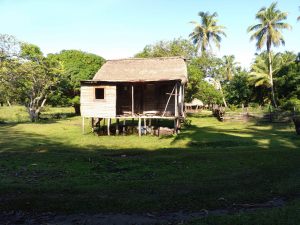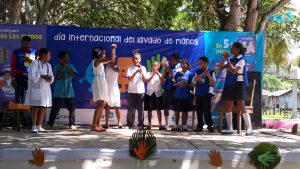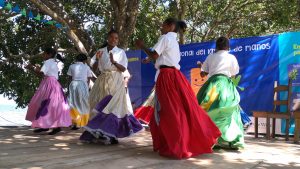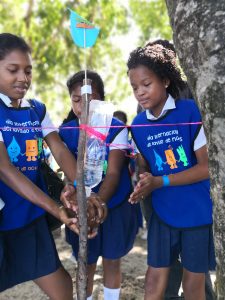Written by Xenia Castellanos and Eva Jiménez, PWW WASH Training Team, Honduras
La Mosquitia is one of the most impressive regions in Honduras. Its inhabitants, the Miskitos, are one of the largest ethnic groups in the country. They have preserved their language and culture since ancient times.
The region contains original landscape, including native flora and fauna, all of which is preserved thanks to a high level of environmental protection within the Biological Reserve of Río Plátano. It is a flood zone, without access by land, which raises the costs of living and makes communication more challenging, both inside and outside of the region.
 The inhabitants of La Mosquitia make their homes entirely from wood harvested locally, to avoid the added cost of importing materials from the interior of Honduras. Houses are built on columns, high off the ground, to minimize damage when the floods arrive.
The inhabitants of La Mosquitia make their homes entirely from wood harvested locally, to avoid the added cost of importing materials from the interior of Honduras. Houses are built on columns, high off the ground, to minimize damage when the floods arrive.
Some students walk upwards of 20 minutes to school, with water to their knees, several months a year. Others have to cross channels or rivers in kayaks. The high water levels make it extremely difficult to obtain safe drinking water and design efficient sanitation.
UNICEF came to La Mosquitia to help solve this issue in local schools. Four years ago, a project for the implementation of water and sanitation infrastructures was started, financed by UNICEF and implemented by Honduran NGO, Agua Para el Pueblo.
As a result of a comprehensive knowledge, attitude and practice study conducted by UNICEF, Center for Affordable Water and Sanitation Technologies (CAWST), and Pure Water for the World (see blog), UNICEF brought in PWW’s WASH Training Team to provide educational training programs that would help to achieve the desired level of long-term sustainability for the project.
The PWW team has delivered workshops focused on water, sanitation and hygiene issues to approximately 100 teachers in the region and worked with teachers to integrate the content into the school curriculum. (see blog)
After initial trainings, monitoring programs have been conducted at the schools to further strengthen the skills acquired during the workshops. In addition, activities have been organized for teachers to exchange their experiences with one another, which helps to motivate them and to create further connections between the WASH content, the school curriculum, and the students.
 On October 12th, UNICEF and Pure Water for the World celebrated Global Handwashing Day in La Mosquitia with teachers, students, regional authorities and community members. Schools participated in an unforgettable community event, which students traveled by sea and land to attend.
On October 12th, UNICEF and Pure Water for the World celebrated Global Handwashing Day in La Mosquitia with teachers, students, regional authorities and community members. Schools participated in an unforgettable community event, which students traveled by sea and land to attend.
The day began with the interpretation of ‘the washing hands song’ and ‘the water song’ (*see video below), by all of the attending students. After, the children were welcomed, along with their teachers, who were all animated and excited about the day.
 As part of the festivities, students had worked with their schoolmates to create a variety of presentations that celebrated the importance of handwashing. There were outstanding theatrical presentations, with messages about washing hands, that the children had been practicing for weeks. There was also an excellent presentation of traditional Miskito dances. The presentations were all given, while a panel of judges and proud families watched.
As part of the festivities, students had worked with their schoolmates to create a variety of presentations that celebrated the importance of handwashing. There were outstanding theatrical presentations, with messages about washing hands, that the children had been practicing for weeks. There was also an excellent presentation of traditional Miskito dances. The presentations were all given, while a panel of judges and proud families watched.
The students gave their all with their beautiful presentations and captivated the judges and the general public with key messages about the importance of hand washing. The judges were given the difficult task of choosing the winning presentations during the awards ceremony.
Another exciting moment was the announcement of the winning schools for the story competition. Students had written and submitted stories related to water, sanitation, and hygiene. The top story awards were given to:
 “The pain of a child“ – the story of a child who became very ill because he did not wash the fruit or his hands before eating;
“The pain of a child“ – the story of a child who became very ill because he did not wash the fruit or his hands before eating;- “The gift of the grandfather” – about a grandfather who advises his children to wash their hands before eating and to share this knowledge with their children and grandchildren;
- “With what water do I wash my hands” – a story that shared not just the importance of washing hands, but of washing hands with treated water and soap, to avoid getting sick.
After the awards ceremony the students enjoyed an exquisite lunch, but not without first washing their hands in the Tipi-Tap (see photo). Participants and spectators gathered to enjoy a delicious meal typical of the Miskitos, called Gluk-Gluk.
Project of UNICEF; Pure Water for the World; Center for Affordable Water and Sanitation Technology (CAWST); with funding from Lottery Fund, Honduras.
*The song “El Agua” is by Brian Falking Amador.
The entire Pure Water for the World team wants to thank all of the participants, regional political authorities, teachers, students and community members for the warm welcome and the great support given to our team, despite being new in the area. We are grateful for the trust placed in us by UNICEF to carry out this program. And, we look forward to continuing to work together until the communities have achieved total empowerment of their safe water and sanitation programs.
PHOTO CREDITS: We want to thank Santiago Salazar Avila, Coordinator of Planning and Evaluation Unit, and Sony Rusell Alvarez, Head of Supervision Unit, from La Mosquitia Department of Education, for sharing your beautiful photos.
